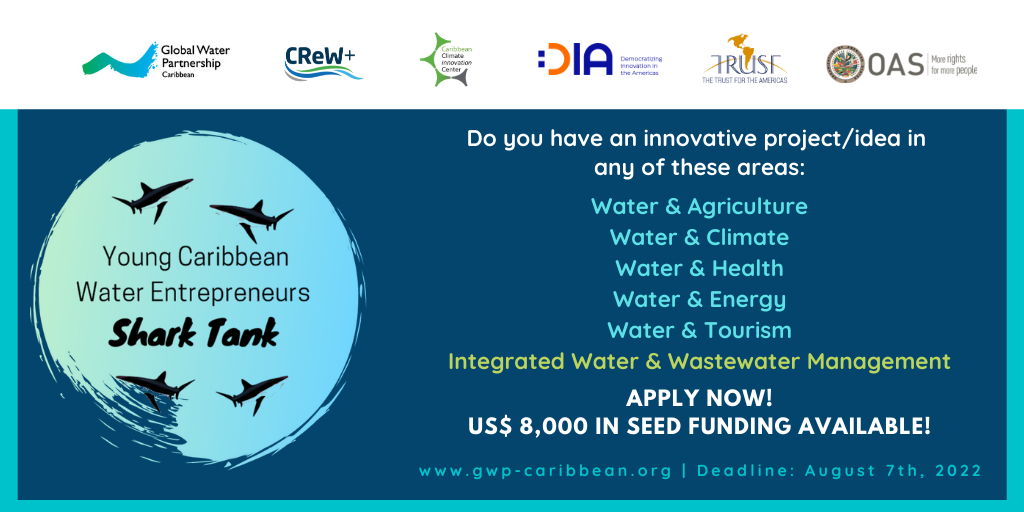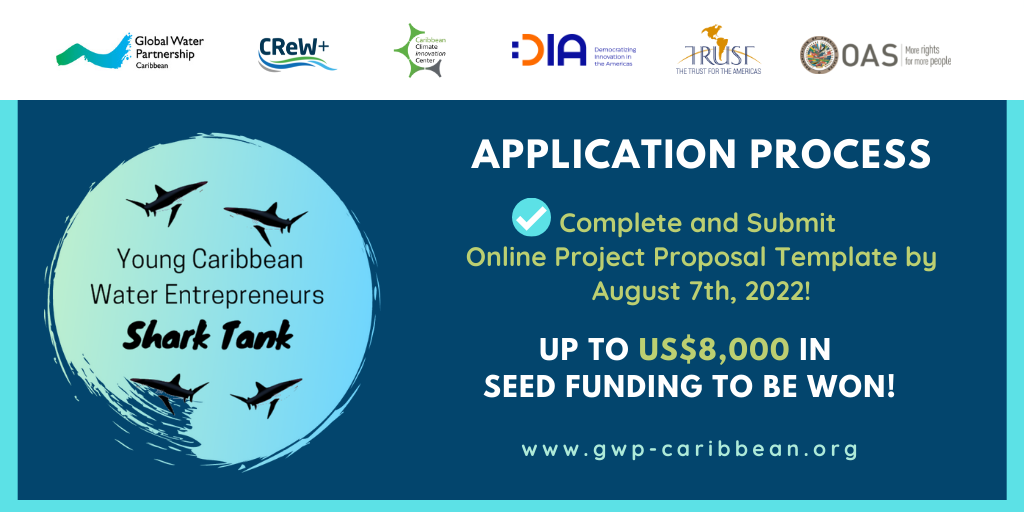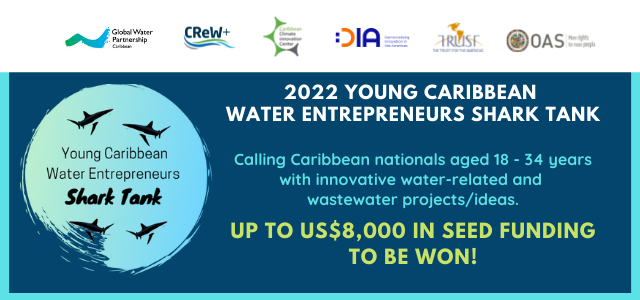Global Water Partnership-Caribbean (GWP-C) has for many years, recognised the critical importance of creating avenues for young people to become involved in water governance and management ventures. Development challenges in the Caribbean will ultimately be inherited by the region’s youth. Young people are providers of solutions and have ideas and energy to act for sustainable development. GWP-C therefore sees the importance of empowering young people to be agents of change, in contributing to and advancing Caribbean water security.
Through GWP-C’s work and interaction with its youth partners and young people within water and related sectors, they often do not have access to funding or resources to easily advance their project ideas. Additionally, they do not always have easy access to technical support to turn their ideas into fully workable projects.
It is therefore with great pleasure that GWP-C announces the launch of its 2022 “Young Caribbean Water Entrepreneurs Shark Tank Competition.” This is the third time the competition is being held, the first being in 2019 and the second in 2020.
Our Partners in the 2022 Competition
In hosting this year’s competition, GWP-C is very pleased to be partnering with the United Nations Environment Programme Caribbean Environment Programme (CEP) and Cartagena Convention Secretariat through the Global Environment Facility-funded (GEF) CReW+ Project, the Caribbean Climate Innovation Center (CCIC) and DIA (Democratizing Innovation in the Americas), which is a regional initiative of The Trust for the Americas and the Organization of American States (OAS). Before we share some further exciting additions to this year’s competition, we would like to share a bit more about our collaborating partners:
GEF CReW+
The GEF CReW+ project is implementing small-scale solutions for the improved management of water and wastewater that can be upscaled and replicated. The project aims to significantly reduce the negative impacts of untreated or partially treated wastewater on the environment and people of the Wider Caribbean Region.
An integrated water and wastewater approach will be taken with solutions also being implemented in selected watersheds and freshwater basins to ensure greater water security for vulnerable rural communities. Construction and rehabilitation measures will be complemented by (i) institutional, regulatory, legislative and regulatory reforms; (ii) sustainable and tailor-made financing options; and (iii) knowledge management and promotion to achieve the Sustainable Development Goals (SDGs) and in particular Goal 6 on Water and Sanitation.
There are 18 participating countries under the GEF CReW+ project which include: Barbados, Belize, Colombia, Costa Rica, Cuba, Dominican Republic, Grenada, Guatemala, Guyana, Honduras, Jamaica, Mexico, Panama, Saint Kitts and Nevis, Saint Lucia, Saint Vincent and the Grenadines, Suriname, Trinidad and Tobago.
The project is funded by the Global Environment Facility (GEF), co-implemented by the United Nations Environment Programme and the Inter-American Development Bank, and co-executed on behalf of UNEP by the Cartagena Convention Secretariat, and on behalf of the IDB by the Organization of American States and Deutsche Gesellschaft für Internationale Zusammenarbeit (GIZ) GmbH. Learn more
UNEP CEP and Cartagena Convention Secretariat
The United Nations Environment Programme (UNEP) established the Caribbean Environment Programme (CEP) in 1981, as one of its Regional Seas Programmes in recognition of the importance and value of the Wider Caribbean Region’s fragile and vulnerable coastal and marine ecosystems, including endemic plants and animals. Countries of the region then adopted an Action Plan also in 1981, that led to the development and adoption of the Convention for the Protection and Development of the Marine Environment of the Wider Caribbean Region on 24th March 1983. Known as the Cartagena Convention, this legally binding instrument promotes the protection and development of the marine environment of the Caribbean Sea and provides the legal framework for the CEP. The Convention entered into force on 11th October 1986.
The Convention is supported by three (3) technical agreements or Protocols on Cooperation concerning Oil Spills, Specially Protected Areas and Wildlife (SPAW) and Pollution from Land-Based Sources and Activities (LBS).
The Caribbean Regional Co-ordinating Unit (CAR/RCU) was established in 1986 in Kingston, Jamaica and is the Secretariat for the Cartagena Convention and the CEP. Its projects and activities fall under three (3) programme areas: Assessment and Management of Environment Pollution (AMEP), Specially Protected Areas and Wildlife (SPAW) and Communication, Education, Training and Awareness (CETA). Learn more
CCIC
The Caribbean Climate Innovation Center (CCIC) was launched in 2013 as a Consortium jointly managed by two (2) leading scientific institutions in the Caribbean, the Scientific Research Council (SRC) based in Kingston, Jamaica and the Caribbean Industrial Research Institute (CARIRI) located in Trinidad and Tobago. CCIC is a part of infoDev’s Climate Technology Program (CTP) which focuses on empowering developing countries to proactively and profitably adapt, develop and deploy climate smart (clean tech) technologies and business models.
CCIC’s thematic areas of focus are (a) water management (b) sustainable agriculture (c) energy efficiency (d) solar energy and (e) resource use efficiency. The organisation is committed to developing a culture of innovation and entrepreneurship in the Caribbean, particularly through enabling entrepreneurs to solve climate-related challenges. The Center is known for its tailored programmes in the region, which provide entrepreneurs with first-world business development training, business model development, mentorship, prototype development, networking and more. Learn more
DIA
DIA (Democratizing Innovation in the Americas) is a regional initiative of The Trust for the Americas and the OAS; launched to foster innovation and empower new generations through access to technology training, specialised curricula, collaboration spaces, mentorship, and financial resources for social and economic ventures. Furthermore, it seeks to strengthen local capabilities, generate collaboration networks, identify and finance disruptive ideas and ventures aimed at solving economic and social challenges of communities in Latin America and the Caribbean. The DIA Programme has a presence in Jamaica, Trinidad and Tobago, Dominican Republic, Belize, Costa Rica, Mexico, Panama, and Colombia.
DIA’s Innovation Labs in the Caribbean create a unique environment that fosters innovation and entrepreneurship, while providing development opportunities to young people in the region. Through access to technology, collaborative spaces, training, and competitive seed funds, Caribbean youth learn tools to develop their business ideas or promote social projects that tackle local challenges. Since 2017, DIA Labs have impacted 3,674 people in the Caribbean through awareness and training processes. It has also established a collaboration network with leading organisations in innovation and technology in the region. With the support of the DIA Labs: 237 young people have undertaken initiatives, developed apps and/or businesses that improve their quality of life and benefit their communities. Additionally, 144 participants have received funding to start and strengthen their projects or ventures. Learn more
Enter the 2022 Young Caribbean Water Entrepreneurs Shark Tank Competition

The Young Caribbean Water Entrepreneurs Shark Tank Competitionseeks to provide a unique opportunity for young persons from the Caribbean, aged 18 to 34 years, to pitch innovative and impactful water-related project ideas to support better water resources management in their community, country or the Caribbean region. For the first time in this year’s competition, there will be two (2) seed funding awards of US$4,000 each.
Category 1
Seed funding of US$4,000 will be awarded for the best project/idea under the following themes:
- Water and Agriculture
- Water and Climate
- Water and Health
- Water and Energy
- Water and Tourism
Category 2
Seed funding of US$4,000 will be awarded for the best project/idea under the theme:
- Integrated Water and Wastewater Management (IWWM)
The introduction of this theme and additional award has been made possible due to GWP-C’s collaboration with the GEF CReW+ project through the UNEP Caribbean Environment Programme (CEP) and Cartagena Convention Secretariat, to build awareness and capacity in the area of IWWM in the Caribbean region.
Please note: Applicants submitting a project/idea under Category 2 (IWWM) specifically, must be a Caribbean national residing in any of the Caribbean GEF CReW+ countries, which are: Barbados, Belize, Cuba, Dominican Republic, Grenada, Guyana, Jamaica, Saint Kitts and Nevis, Saint Lucia, Saint Vincent and the Grenadines, Suriname and Trinidad and Tobago.
Entry Requirements and Competition Timeline
Who can enter the “Young Caribbean Water Entrepreneurs Shark Tank Competition?”
You must be a Caribbean national residing in the Caribbean region, aged 18 – 34 years with an innovative project/idea under any of the following themes:
Category 1:
- Water and Agriculture
- Water and Climate
- Water and Health
- Water and Energy
- Water and Tourism
Category 2:
- Integrated Water and Wastewater Management (IWWM)
Please note the special country eligibility criteria (outlined previously) for Category 2 (IWWM). It must also be noted that entrants can only apply under one category (i.e. Either Category 1 or 2).

PHASE 1: Enter by Submitting Your Water-Related Project Proposal
The competition has officially been launched today April 25th, 2022 and the deadline for the submission of your application/project proposal is August 7th, 2022 at midnight Atlantic Standard Time (AST). Entrants must: Complete and submit the competition’s online project proposal template here by August 7th, 2022: https://forms.gle/mTw1fTjQSUPqjshp9.
Please note: All project proposals must be submitted in English and a maximum of two (2) persons can apply together on a submission.
PHASE 2: Review of Project Proposals
All submitted project proposals will be reviewed by the competition’s first group of sharks. These sharks/judges will be different from those in the final round of the competition.
At least ten (10) project proposals will be selected to advance to the final stage of the competition. Each of the finalists will receive feedback, critiques and advice on their proposals to prepare to pitch their water-related project/idea to the second group of sharks in the finals of the competition.
Proposals will be assessed based on various areas (but not limited to):
- Innovation
- Water Resources Management Relevance
- Wastewater Relevance (Specific to Category 2)
- Practicality of Implementation
- Projected Impact
- Financial Feasibility
- Project Sustainability
- Stakeholder Engagement and Partnerships
- Business/Industry Analysis
- Market Research
- Competitive Analysis
- Gender Mainstreaming
PHASE 3 (Final Stage): The 5-Minutes Pitch
Finalists in the competition whose projects fall within Category 1 will compete for the prize of US$4,000. Similarly, finalists whose projects fall under Category 2, will also compete for a separate prize of US$4,000.
All finalists will be required to deliver a 5-minutes pitch of their project before a panel of sharks/judges. Finalists will be provided with relevant guidelines/criteria at least two (2) weeks in advance of their final pitch to the sharks. The pitches to the panel of sharks will take place virtually.
The Sharks/Judges
There will be two (2) groups of “sharks” or judges in the competition. The sharks/judges will include a mix of professionals/practitioners such as:
- Private Sector Representatives
- Water Specialists
- Wastewater Management Specialists
- Entrepreneurs
- Innovation Strategists
- Business Development Specialists
- Youth Representatives
- Marketing Specialists
- Government Officials
- Water and Environmental Specialists
- Other Practitioners (in fields related to the competition’s themes)
Benefits to Participants
Apart from the two (2) seed funding awards of US$4,000 each, participants in the competition will be benefit from:
- Participating in CCIC’s 2022 entrepreneurial boot camps if hosted/available in a participant’s home country.
- Participating in DIA’s 2022 Caribbean Labs if hosted/available in a participant’s home country.
Download 2022 Competition Brief
Easily access all details about the 2022 Young Caribbean Water Entrepreneurs Shark Tank by downloading the competition brief here.
Contact Us
For any questions related to the competition, please e-mail the GWP-C Secretariat at info@gwp-caribbean.org. Also, please ensure that “2022 Shark Tank” is included in the title of your e-mail.
